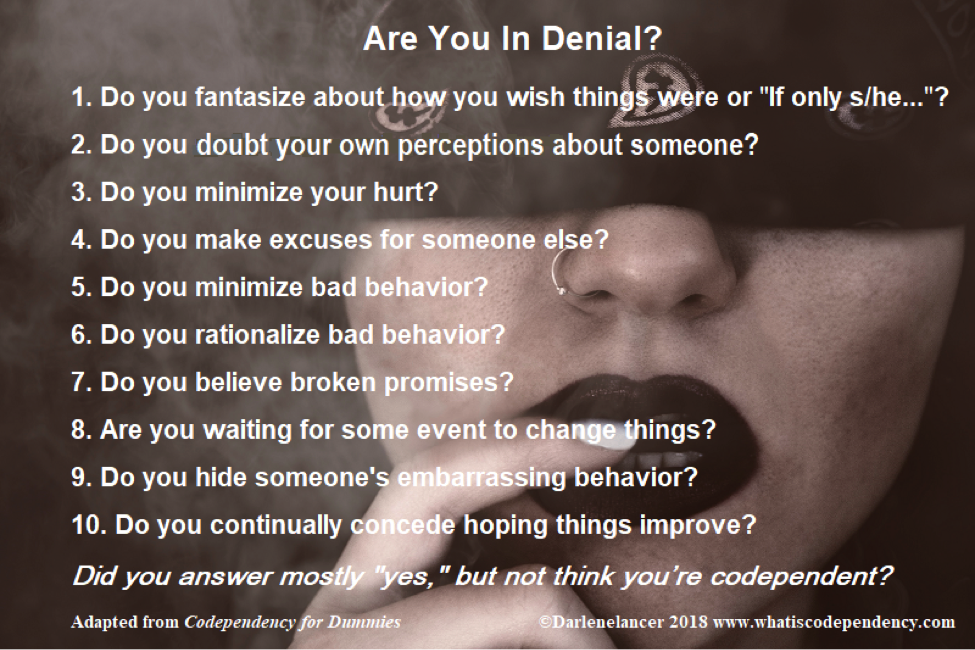
Recognizing & Overcoming Denial
By Darlene Lancer, JD, MFT
Denial: A Serious, Invisible Problem
Denial is serious. It’s a refusal to acknowledge truth or reality. Sometimes, it has benefits, but it can also be our undoing and can have life-threatening consequences. It affects not only individuals. “Group-think” can be particularly dangerous on a group level. Sub-cultures, religious sects, organizations, and political zealots can deny abuse, addiction, racism, genocide, corruption, and criminality.
Denial may be conscious, but is usually unconscious. We all do it. It can be tricky to uncover something that is unconscious. (See “Are You in Denial?”) We not only deceive ourselves, we forget, excuse, rationalize, and minimize. We might be aware of the facts, but deny or minimize the consequences, or even acknowledge them, but stubbornly refuse to change or get help.

Why we deny
Our brain is wired for survival, and denial serves that function. There are many reasons for denial, including avoidance of physical or emotional pain. Denial is the first and simplest defense mechanism children use when in trouble. Adults consciously deny wrongdoing, too. Lies are usually motivated by self-preservation and fear of punishment. While not admirable, they’re understandable, though less sympathetic when motivated by a quest for power. What’s more troublesome is the denial of those who believe them.
Denial is adaptive when it helps us cope with difficult emotions, as in the initial stages of grief following the loss of a loved one, particularly if the separation or death is sudden. Denial allows our body-mind to adjust to the shock more gradually.
Denial also builds cohesion, especially between loved ones. It’s a unifying force between spouses, and among families, groups, or political parties. We overlook things that might that might cause arguments, hurt, or separation. One study showed that people will forgive someone they know four to five times more than a stranger. Idealization supports denial and blinds us to negative facts.
We deny reality to maintain the status quo due to fear of change and the unknown. For this reason, people believe the demonization of immigrants, or other races, or religions. If we favor a politician or love a cheating or abusive partner, we may ignore truths that would create disillusionment and/or require us to struggle with uncomfortable feelings and what to do. A deceived spouse might prefer to believe lies rather than confront an intolerable situation that is not only painful, but that could lead to unwanted consequences, like divorce. (See “Secrets and Lies: The Damage of Deception”).
We will defend untruths and blatant lies of people we want to believe. We tend to distrust information that’s contrary to our beliefs (including unconscious ones), and even double down to reduce inner conflict or “cognitive dissonance.” This process is termed motivated reasoning that helps regulate emotion. We consciously and unconsciously select information that affirms our beliefs and disregard facts that don’t. When we have internalized shame, we will do the same with positive feedback that is incongruent with internal negative beliefs about ourselves. Low self-esteem makes it difficult to receive a compliment, praise, and love. If we believe that we don’t deserve it, our minds can actually twist a compliment into criticism, and we can’t be convinced otherwise!
How we’re harmed
When we deny negative feelings and memories, it deadens our senses. All our feelings get suppressed, including joy and love. Similarly, when we deny our wants and needs, our enjoyment of life diminishes. We can deny positive input as well as negative. Denial can restrict us from expressing our rights, our power, and our abilities, diminishing our self-esteem and capacity to pursue our goals.
Moreover, when we repeatedly tune out reality, problems grow. Research shows that denial of stress and negative emotions can lead to heart attacks, surgery, and death. Sweeping something important under the rug makes it harder to correct later, whether for physical, mental, or marital problems. Our discomfort might manifest as passive-aggressive or addictive behavior, displaced anger (yelling at our children instead of our spouse), or as a physical or mental health problem.
When a society denies racism, corruption, immorality, or abuse of power, institutions are at risk. Like individuals, societies sicken. People become numb, develop a sense of futility, and a downward spiral ensues that allows the worst in human nature.
How to change
Change requires courage and a desire to live in truth. We often need support, especially when the fear of facing something or someone is great. Fear of shame causes needless anxiety. It’s not a good reason to delay, because we can overcome shame. (See Conquering Shame and Codependency.) If we’re in denial because of guilt, we can forgive ourselves and make amends to others. This builds self-esteem.(See Freedom from Guilt and Blame: Finding Self-Forgiveness.)
- Become more mindful through meditating and journaling.
- When you have a knee-jerk reaction to opposing views, take a breath. You don’t have to agree, but listen to alternative opinions and interpretations of facts. Look at all the facts.
- Challenge your underlying assumptions. Where do your beliefs come from? Are they helpful? Might reasonable people disagree? See “Deprogramming Codependent Beliefs.”
- Are you having wishful thinking about a problem when the facts prove otherwise?
- Do you excuse, rationalize, or minimize a problem or conceal it from others? (Take the quiz in Codependency for Dummies.)
- Don’t bury problems, and assume no one notices. Instead, be willing to initiate difficult conversations about uncomfortable subjects.
- Take constructive action to reduce worry and stress. See “6 Steps for Making Change.”
- Don’t procrastinate. Talk to a professional about your concerns.
©Darlene Lancer 2018
This article was originally published here, and is presented with the author’s kind permission.
Photo by Esther Tuttle on Unsplash
Darlene Lancer is a Licensed Marriage and Family Therapist and expert on relationships and codependency. She’s the author Conquering Shame and Codependency: 8 Steps to Freeing the True You and Codependency for Dummies and six ebooks, including: 10 Steps to Self-Esteem, How To Speak Your Mind – Become Assertive and Set Limits, Dealing with a Narcissist: 8 Steps to Raise Self-Esteem and Set Boundaries with Difficult People and Freedom from Guilt and Blame – Finding Self-Forgiveness, also available on Amazon. Ms. Lancer has counseled individuals and couples for 30 years and coaches internationally. She’s a sought after speaker in media and at professional conferences. Her articles appear in professional journals and Internet mental health websites, including on her own, www.whatiscodependency.com, where you can get a free copy of “14 Tips for Letting Go.”




